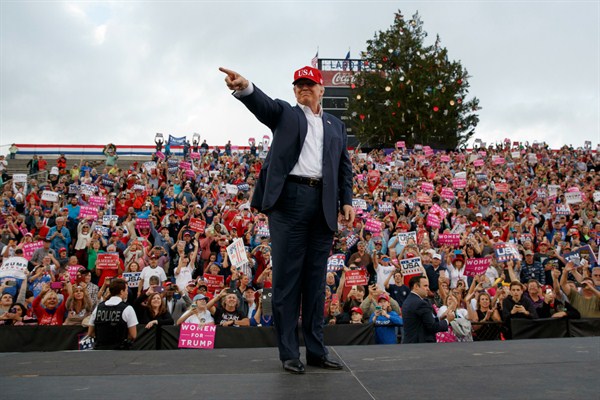In July, World Politics Review launched its Global Agenda series, inviting authors to make their case for the biggest priorities facing the international order and U.S. foreign policy today. Over the following months, contributors took turns diagnosing the gravest challenges, and greatest opportunities, facing the global community. 2016 has come and gone, bringing a series of tectonic shifts to the geopolitical landscape. What developments might 2017 bring about as an encore? WPR has compiled 11 articles from the series that provide a roadmap to the upcoming year in international affairs.
The following 11 articles are free to nonsubscribers until Jan. 19.
International Security
The Real Risk of Unintended U.S.-Russia Conflict
A direct conflict between Russia and the U.S. is more likely today than at any time since the worst years of the Cold War, Matthew Rojanskywarned in July. This may sound implausible. Yet increasing deployments by both sides, coupled with severely constrained direct dialogue, mean that dangerous incidents will become more likely and will be harder to defuse. Can the U.S. and Russia make the improvements in communication necessary to avoid an accidental war?
In September, Hugh White wrote that the most urgent priority in international affairs today is to avoid a war between the United States and China. The consequences of such a war, he argued, would be so vast as to dwarf all the other serious perils the world faces. Power politics has come roaring back to center stage, and nowhere is that more evident than in America’s intensifying rivalry with China.
For prosperous and stable Western nations, the cost of terrorism is usually dwarfed by the cost of their reactions to it. According to Benjamin Friedman’s August article, avoiding such overreaction is the most pressing challenge in security policy today. Hyperbolic rhetoric, wasteful spending, retaliatory wars and border closures are both symptoms of this overreaction and obstacles to a more effective counterterrorism strategy.
Despite all the recent attention paid to cyberwar, cybersecurity in the U.S. has actually gotten worse, wrote James Andrew Lewis in December. Current U.S. strategies are inadequate to respond to, much less succeed against, threats from Russia and others in a 21st-century context. Lewis argues that this status quo needs to change if Washington is to defend not only American democracy, but that of its allies moving forward.
The Rise of Populism
Renewed criticism of free trade is easier to understand when looking at recent data about the winners and losers of globalization from the 1990s until the financial crisis. But what accounts for the broader appeal of populist parties that are against globalization among a much larger section of the electorate? Lauren M. Phillips examines the economic roots of populism’s global rise in her October contribution.
The conventional wisdom gets the link between Donald Trump and rising anti-trade views in the U.S. backward, wrote Daniel McDowell in October. The distributional consequences of globalization are not driving protectionist attitudes in the U.S.—Trump is. If upon taking office the president-elect acts on the isolationist fervor he cultivated through his rhetoric, the effects on the global economy could be catastrophic.
In the wake of November’s U.S. election, WPR Editor-in-Chief Judah Grunstein explained that Donald Trump’s victory offered a clear example of how emotion and affect increasingly drive political behavior, putting the liberal international order at risk. Those who now seek to shore that order up, he argues, cannot hope to do so without reflecting upon why it bears the brunt of so much resentment and hostility.
Human Rights and Development
America’s traditional role in promoting democracy and human rights abroad has fallen out of favor in a serious way, wrote Richard Fontaine in October. Yet the cause remains urgent, more so than at any time in recent memory. Supporting human rights gives purpose and direction to U.S. foreign policy. The next administration should embrace America’s historical role in promoting freedom abroad, lest it fail to maintain its own legitimacy.
In September, Valerie Hudson wrote that the world must prioritize finding a way to end violence and discrimination against women. In any other context, the violence committed by men against women would be considered warfare, she points out. When the two halves of the population do not live in peace with one another, how is it then possible to eliminate other forms of instability and conflict?
The world has made vast strides in health care over recent decades. Yet the recent impasse in the U.S. Congress over appropriating funds to combat the Zika virus exemplifies the challenges still faced in addressing global health. There is a generalized sense that something needs to be done, but disagreement over who should do what—and who should pay for it, explained Jeremy Youde in September.
In December, Connie Veillette suggested that President-elect Donald Trump will soon be confronted with global challenges that will test his popular campaign rhetoric of “America First.” Trump’s foreign policy team may find that agenda difficult to implement, she writes, since instability and conflict from fragile and failed states in other parts of the world do not respect national borders. Turning inward would only serve to exacerbate global instability, threatening America’s own national security in turn.

